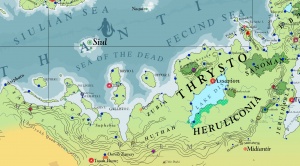Difference between revisions of "Wild Coast of Danona"
Trismegistus (talk | contribs) (created) |
Trismegistus (talk | contribs) m |
||
| (2 intermediate revisions by the same user not shown) | |||
| Line 1: | Line 1: | ||
[[File:MapWildCoastDanona.jpg|thumb|300px|The Wild Coast of Danona rests in on the continent's northern coast.]] | [[File:MapWildCoastDanona.jpg|thumb|300px|The Wild Coast of Danona rests in on the continent's northern coast.]] | ||
| − | The Wild Coast of Danona is a region of the continent so-named for the presence of many [[humanlike]] tribes and the absence of any great human presence. The shoreline between [[New Phionace]] and [[Ariphain]], including [[Sanoman]], is generally considered the Wild Coast of Danona. [[Thrysto]], [[Heruliconia]], [[Huthah]], [[ | + | The Wild Coast of Danona is a region of the continent so-named for the presence of many [[humanlike]] tribes and the absence of any great human presence. The shoreline between [[New Phionace]] and [[Ariphain]], including [[Sanoman]], is generally considered the Wild Coast of Danona. [[Thrysto]], [[Heruliconia]], [[Huthah]], [[Khrygia]], and the [[Zanzary Coast]] are part of the Wild Coast. The [[merfolk]] islands of the [[Sea of the Dead]] are usually included in the cultures of the Wild Coast. The [[Massady Geth Mountains]] form the southern boundary of the region. The region has very warm to hot summers and moderate winters. It receives modest rains in the winter, except in the foothills of the mountains where it receives more plentiful rains. [[Lake Dis]] is the largest inland body of the region. |
| − | The Wild Coast is famous for its indigenous [[humanlike]] tribes. It is the place where the fabulous dye, [[imridsul]], is produced and the home of the [[minotaur]]s. During the [[Yophenthean Empire]], the region was heavily colonized by humans, but their numbers waned during the [[Middle Ages]] and humans never regained as | + | The Wild Coast is famous for its indigenous [[humanlike]] tribes. It is the place where the fabulous dye, [[imridsul]], is produced and the home of the [[minotaur]]s. During the [[Yophenthean Empire]], the region was heavily colonized by humans, but their numbers waned during the [[Middle Ages]] and humans never regained as strong a foothold in the region in later centuries. There is a small but significant [[Gorcorumbese Giant]] minority in the Wild Coast, most of whom settled there during the [[Gorcorumbese Empire]]. |
=See Also= | =See Also= | ||
Latest revision as of 21:16, 25 October 2017
The Wild Coast of Danona is a region of the continent so-named for the presence of many humanlike tribes and the absence of any great human presence. The shoreline between New Phionace and Ariphain, including Sanoman, is generally considered the Wild Coast of Danona. Thrysto, Heruliconia, Huthah, Khrygia, and the Zanzary Coast are part of the Wild Coast. The merfolk islands of the Sea of the Dead are usually included in the cultures of the Wild Coast. The Massady Geth Mountains form the southern boundary of the region. The region has very warm to hot summers and moderate winters. It receives modest rains in the winter, except in the foothills of the mountains where it receives more plentiful rains. Lake Dis is the largest inland body of the region.
The Wild Coast is famous for its indigenous humanlike tribes. It is the place where the fabulous dye, imridsul, is produced and the home of the minotaurs. During the Yophenthean Empire, the region was heavily colonized by humans, but their numbers waned during the Middle Ages and humans never regained as strong a foothold in the region in later centuries. There is a small but significant Gorcorumbese Giant minority in the Wild Coast, most of whom settled there during the Gorcorumbese Empire.
See Also
| This article is a stub. It requires further development by the creator. |
